As a recruiter or hiring manager, you're tasked with finding top mobile development talent to keep up with the growing demand for mobile applications. Companies often struggle in this process due to unclear job descriptions, inefficient screening processes, or a lack of understanding of the specific skills required for success in this role. Hiring the right mobile developer is crucial for ensuring your mobile projects are completed on time and meet high standards of quality and functionality.
In this article, we provide a comprehensive guide to hiring mobile developers. We'll cover everything from writing effective job descriptions, utilizing skills tests, to structuring interview stages. You'll also find insights on the differences between iOS and Android developers, and the ranks within mobile development. For further resources, visit our page on the Mobile Developer Interview Questions.
Table of contents
Why Hire a Mobile Developer?
To decide if you need a mobile developer, start by identifying the business problems they can solve. For example, you might need to create a user-friendly app for your customers or optimize an existing mobile platform for better performance.
Consider prioritizing these use cases:
- Developing a new mobile app to expand your market reach
- Improving the user experience of your current mobile offerings
- Integrating mobile solutions with your existing systems
If you're unsure about committing to a full-time hire, consider working with a consultant first. This can help you assess the value a mobile developer can bring before building an in-house team. For a comprehensive hiring process, check out our guide on how to hire a mobile developer.
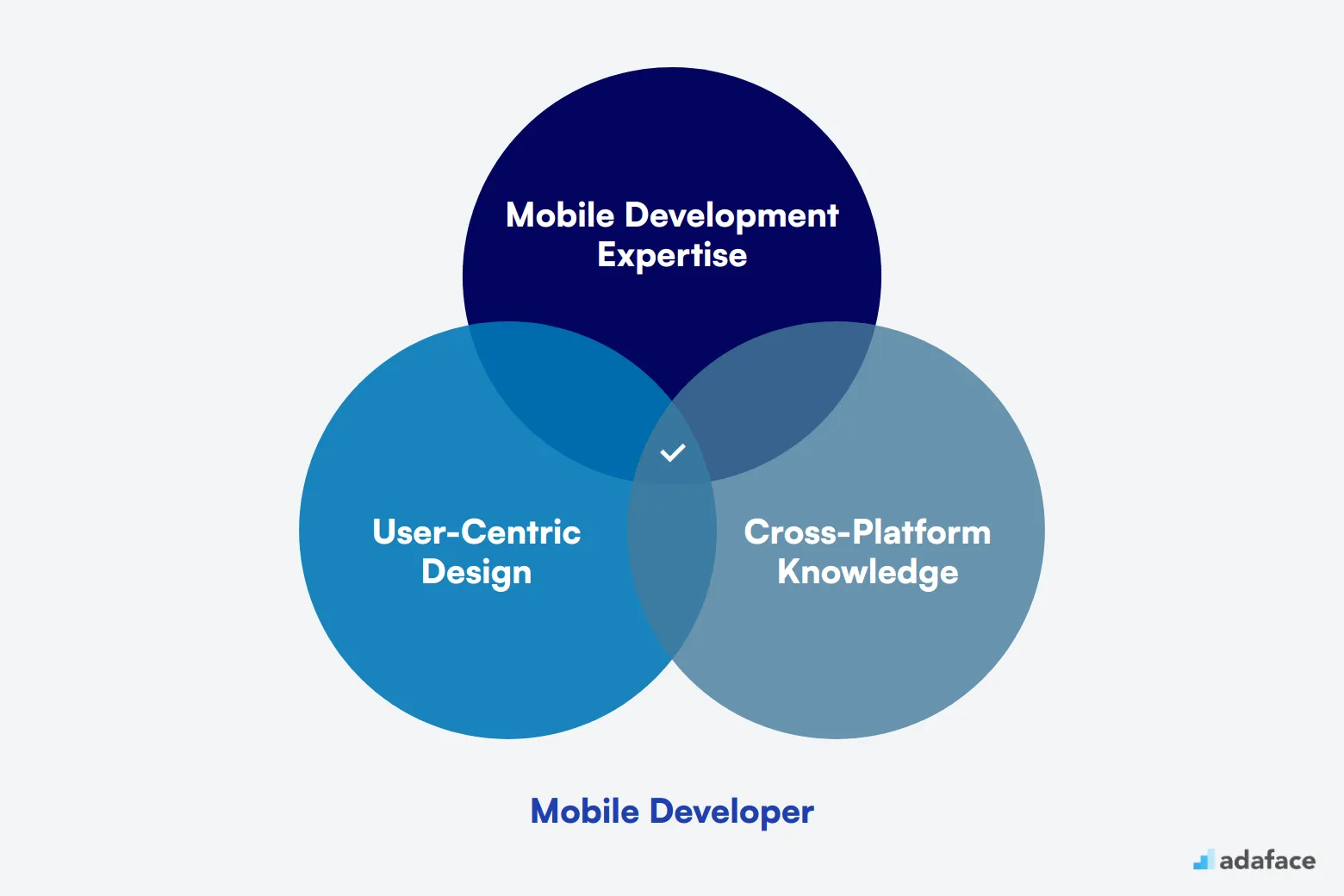
Mobile Developer Hiring Process
The hiring process for a mobile developer can take about 6-8 weeks. Here’s a streamlined overview of the key steps involved.
- Define the role: Start with a well-crafted job description that outlines the skills and responsibilities necessary for the position. Post it on relevant job boards to attract the right candidates.
- Resume screening: Expect to receive applications within the first week. Screen resumes to shortlist candidates that meet your criteria.
- Skill assessment: Conduct skill tests or coding assessments focused on mobile development. Allow about a week for this step to evaluate candidates' technical abilities.
- Interviews: Shortlisted candidates should then go through one or more interview rounds. This helps in assessing both technical skills and cultural fit within your organization.
- Final selection: After interviews, choose the best candidate and move to the offer stage. Ensure the offer is competitive to attract top talent.
Overall, the hiring process can vary but expect it to take around 1-2 months based on your pace. Now, let's explore each step in detail, providing handy checklists and materials to guide you through.
Skills and Qualifications to Look for in a Mobile Developer
When hiring a Mobile Developer, it's easy to miss the mark if you don't draw a clear distinction between what your company requires versus what it would prefer. Every company has unique demands, so a skill that's a must-have for one might be a nice-to-have for another. For example, while some teams prioritize Swift and Kotlin, others might lean towards cross-platform frameworks like React Native.
To guide you through this process, focus on the following required skills and qualifications before branching into preferences. This will help you identify the key strengths needed for your team and avoid common pitfalls in creating the ideal candidate profile. For more insights on technical recruitment, you might find our tech recruitment blog helpful.
| Required skills and qualifications | Preferred skills and qualifications |
|---|---|
| Proficiency in mobile app development languages (e.g., Swift for iOS, Kotlin for Android) | Experience with cross-platform development frameworks (e.g., React Native, Flutter) |
| Experience with mobile app development frameworks and tools | Knowledge of backend technologies and RESTful APIs |
| Understanding of mobile UI/UX design principles | Familiarity with mobile app security best practices |
| Knowledge of mobile app lifecycle and deployment processes | Experience with mobile app testing and debugging tools |
| Familiarity with version control systems (e.g., Git) | Understanding of mobile app performance optimization techniques |
How to Write an Effective Mobile Developer Job Description
Once you've identified the key skills and qualifications for your mobile developer role, it's time to craft a compelling job description. A well-written JD is crucial for attracting top talent in this competitive field.
Here are some tips to create an impactful mobile developer job description:
• Highlight specific technologies and platforms: Clearly state whether you're looking for iOS, Android, or cross-platform developers. Mention key programming languages like Swift, Kotlin, or React Native.
• Balance technical skills with soft skills: While coding expertise is important, don't forget to emphasize problem-solving abilities, teamwork, and communication skills.
• Showcase exciting projects: Describe interesting mobile apps or features the candidate will work on to spark their interest.
• Outline growth opportunities: Mention possibilities for skill development, mentorship, or career advancement to attract ambitious developers.
Top Platforms to Source Mobile Developers
Now that you have a clear job description, it's time to list your mobile developer position on job platforms to attract qualified candidates. The right platform can significantly impact the quality and quantity of applications you receive, so choosing wisely is key.
LinkedIn Jobs
Ideal for finding full-time mobile developers. Large professional network with detailed profiles and company information.

Indeed
Comprehensive job search engine aggregating listings from various sources. Good for a wide range of mobile development positions.

Dice
Specialized in tech jobs, including mobile development. Offers advanced search features for specific skills and technologies.
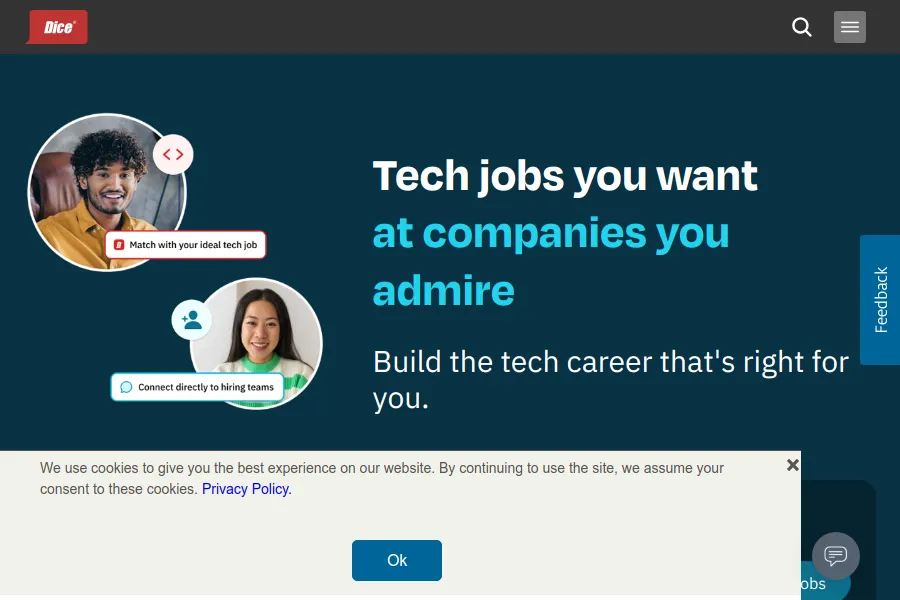
Other notable platforms include AngelList for startup-focused roles, Toptal for elite freelancers, Stack Overflow Jobs for tech-specific listings, Glassdoor for transparency-seekers, FlexJobs for remote positions, and Hired for curated matching. Each platform caters to different needs, so consider your specific requirements when choosing the right assessment platform for your hiring process.
How to Screen Mobile Developer Resumes Effectively
Screening resumes is the first step in the hiring process to filter out candidates who don't meet the basic requirements for a mobile developer position. This helps recruiters focus their time and resources on candidates who are more likely to succeed in further evaluation stages.
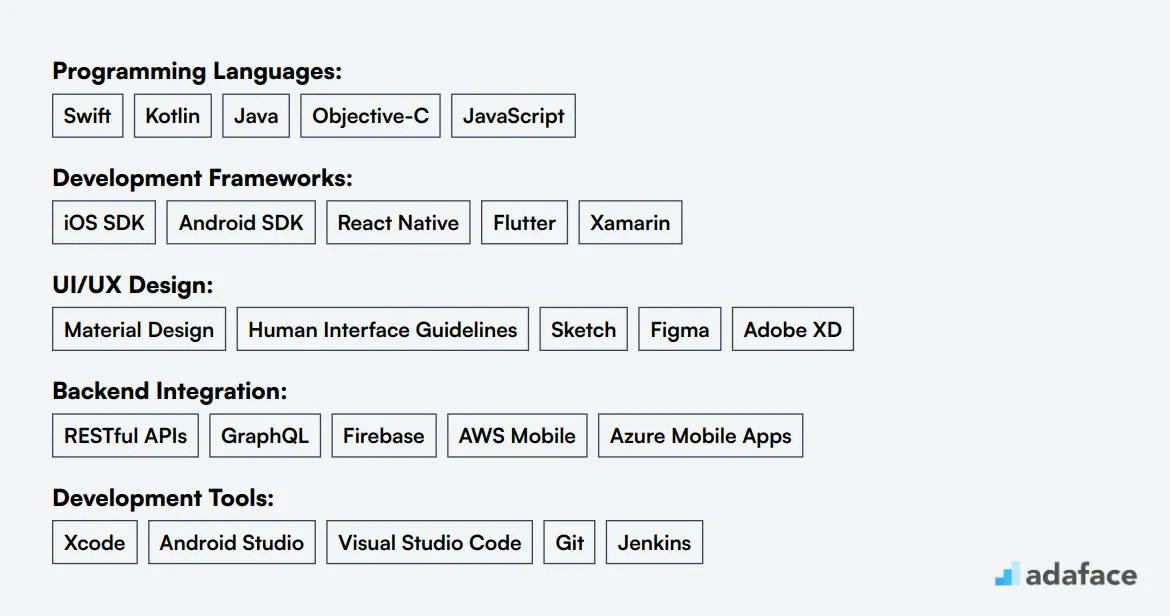
To manually screen resumes, look for keywords that align with the required skills for mobile development. These include programming languages like Swift and Kotlin, as well as frameworks like Android SDK and iOS SDK. Note keywords related to UI/UX design principles and mobile app lifecycle as well. The aim here is to quickly identify resumes that contain these keywords and move them to the interview stage.
With advancements in AI, you can now use LLMs to screen resumes based on specific criteria. AI tools can help you automatically highlight important skills and give a score based on keyword matches. This saves time and ensures no potential candidate is overlooked.
Here's a prompt you can use with AI tools to screen mobile developer resumes:
TASK: Screen resumes to match job description for mobile developer role
INPUT: Resumes
OUTPUT: For each resume, provide following information:
- Email id
- Name
- Matching keywords
- Score (out of 10 based on keywords matched)
- Recommendation (detailed recommendation of whether to shortlist this candidate or not)
- Shortlist (Yes, No or Maybe)
RULES:
- If you are unsure about a candidate's fit, put the candidate as Maybe instead of No
- Keep recommendation crisp and to the point.
KEYWORDS DATA:
- Programming Languages (Swift, Kotlin, Java, Objective-C, JavaScript)
- Development Frameworks (iOS SDK, Android SDK, React Native, Flutter)
Recommended Skills Tests for Mobile Developer Assessment
Skills tests are a great way to evaluate Mobile Developers objectively. They help you assess candidates' practical abilities beyond what's listed on their resumes. Let's explore some key tests for this role.
Android Skills Test: An Android online test evaluates a developer's proficiency in Android app development. It covers areas like UI design, data storage, and Android SDK usage.
iOS Skills Test: For Apple-focused roles, an iOS online test is useful. It assesses knowledge of Swift, Objective-C, and iOS frameworks.
React Native Skills Test: A React Native test is ideal for cross-platform development roles. It checks understanding of React Native components, state management, and native modules.
UI/UX Design Test: Mobile developers often need design skills. A UI/UX design test can evaluate their ability to create user-friendly interfaces and smooth user experiences.
Programming Logic Test: Regardless of platform, strong programming logic is essential. Consider including a general programming test to assess problem-solving and algorithmic thinking skills.
Recommended Case Study Assignments to Screen Mobile Developers
Case study assignments can be a helpful method to evaluate a candidate's practical skills for mobile development roles. However, these assignments can be time-consuming, leading to lower candidate participation and the risk of losing potential talent. Despite these challenges, they offer a realistic approach to assess a developer's abilities. Here are some recommended assignments that strike a balance between depth and brevity.
Create a Simple Weather Application: This case study involves developing a mobile app that fetches and displays weather data using a third-party API. It is recommended because it tests a candidate's ability to integrate APIs, manage data, and create a user-friendly interface. Consider using this assignment to gauge an applicant's proficiency in handling real-world problems.
Redesign an Existing Mobile Application: Task candidates with improving the user experience of a specified app. This assignment helps assess their understanding of user-centric design and their creativity in refining existing features. It's a great way to see how they approach UI/UX challenges and implement design improvements.
Build a Cross-Platform To-Do List App: This assignment requires candidates to develop a simple app that works on both Android and iOS platforms, assessing their skills in using frameworks like React Native or Flutter. The focus here is on their ability to build and manage a project that operates seamlessly across different devices. For detailed insights, visit Skills Required for Mobile Developer.
How to Structure the Interview Stage for Hiring Mobile Developers
Once a candidate has successfully passed the skills test stage, it's time to move them to technical interviews where their hard skills are evaluated. While skills tests are great for filtering out unfit candidates, technical interviews help identify the best fit for the role. By focusing on their ability to solve real-world problems, you ensure they have what it takes to succeed. Here are some sample interview questions to guide you in this process.
Consider asking questions like: 'How do you manage memory usage in a mobile application?' to assess their understanding of performance optimization. 'Explain the process of debugging a mobile app crash.' reveals their problem-solving approach. 'Discuss the differences between using React Native and native app development.' tests their knowledge of different development frameworks. 'Describe a challenging mobile app project you worked on and the outcome.' helps gauge their experience and project handling skills. Finally, 'What measures do you take to ensure app security?' evaluates their awareness of security best practices in mobile development.
What is the cost to hire a Mobile Developer?
Hiring a Mobile Developer can vary significantly based on location, experience, and skill set. In the United States, the average salary is approximately $128,000, while in countries like the Philippines, it averages around ₱400,500. These figures provide a solid foundation for setting competitive salaries to attract the right talent.
Mobile Developer Salary in the United States
The average salary for a Mobile Developer in the United States is approximately $128,000. Salaries vary significantly by location; for instance, in San Francisco, top developers can earn up to $220,000, while in Atlanta, the range starts around $74,000. Understanding these figures can help you set realistic salary expectations during the hiring process.
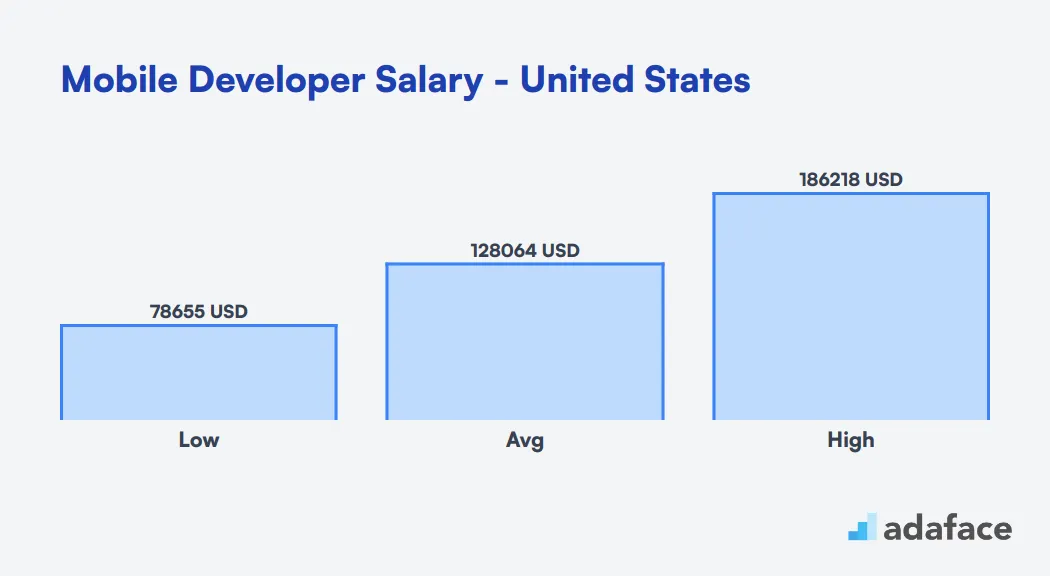
Mobile Developer Salary United Kingdom
In the United Kingdom, the average salary for a Mobile Developer is around £45,000 per year. Entry-level positions typically start at £30,000, while experienced developers can earn upwards of £70,000. Location and industry can significantly impact these figures, with opportunities in London often offering higher salaries due to the increased cost of living.
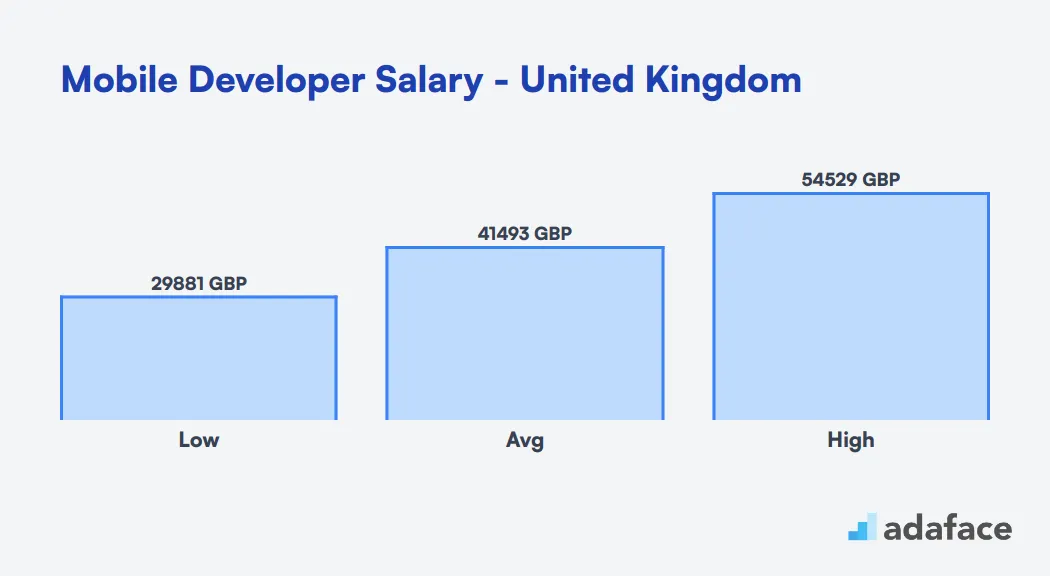
Mobile Developer Salary in Australia
Mobile developers in Australia can expect competitive salaries across major cities. The national average salary ranges from AUD 75,000 to AUD 170,000, with a median of about AUD 113,000 per year.
Salaries vary by location, with Canberra offering the highest median at AUD 188,000, followed by Sydney CBD at AUD 141,000. Melbourne and Perth offer lower medians around AUD 108,000 and AUD 105,000 respectively.
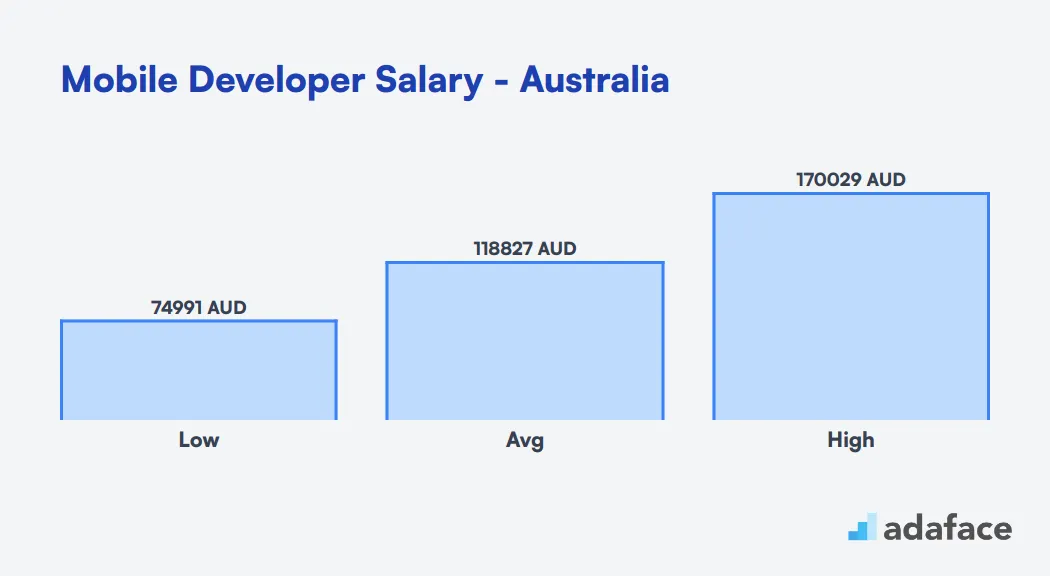
Mobile Developer Salary in the Philippines
The salary of mobile developers in the Philippines varies widely depending on location and experience. On average, developers can expect to earn around ₱400,500 annually, with the lowest reported salaries starting at approximately ₱136,517 and the highest reaching up to ₱753,521.
In major cities, the salary range tends to be higher; for instance, in Taytay, the mean salary is around ₱1,046,586, while in Cebu City, it averages ₱823,898. Understanding these figures will help you align your compensation packages to attract top talent.
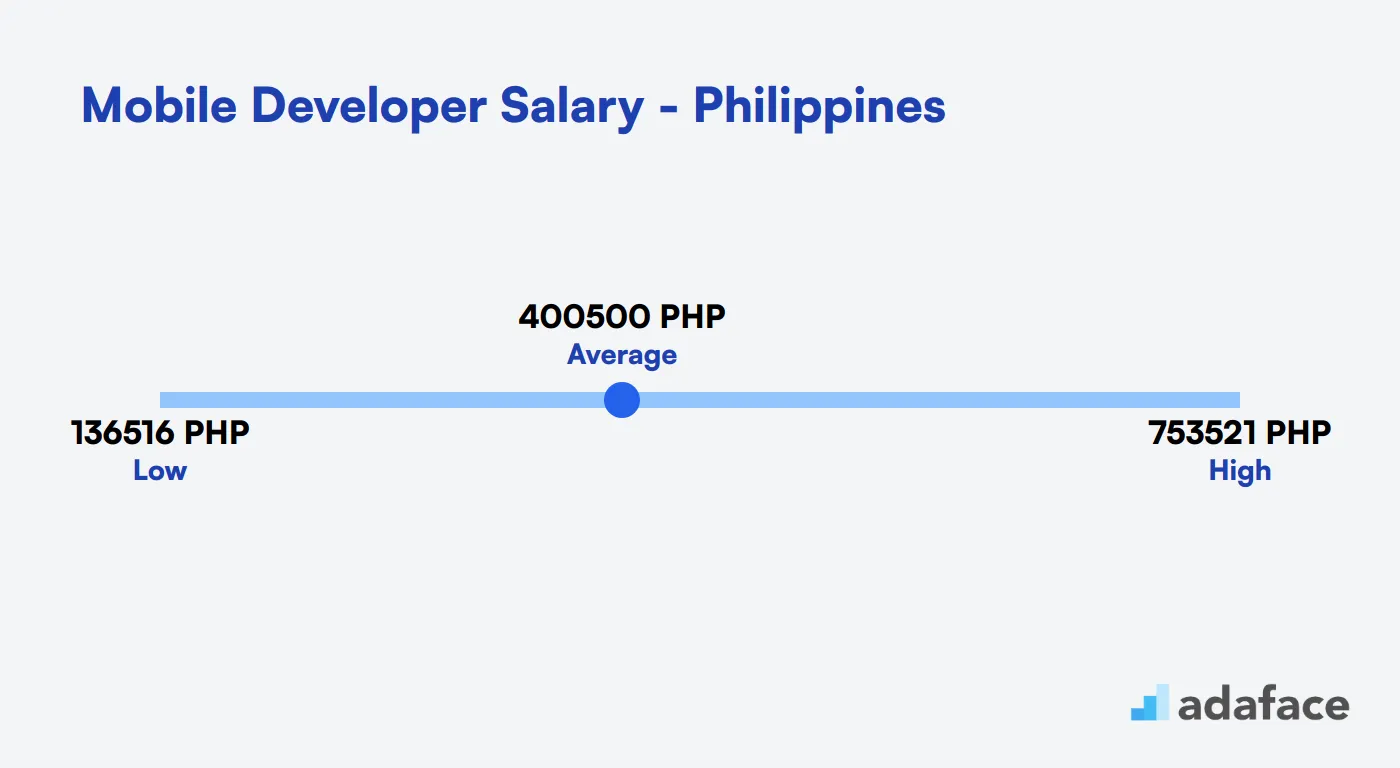
Mobile Developer Salary in Canada
In Canada, Mobile Developer salaries vary across cities. Toronto offers a median salary of CAD 74,969, while Ottawa tops the list with a median of CAD 118,165. Vancouver and Calgary fall in between, with medians of CAD 103,105 and CAD 104,224 respectively.
The national median salary for Mobile Developers in Canada is approximately CAD 80,049. Entry-level positions start around CAD 49,962, while experienced developers can earn up to CAD 128,255 annually.
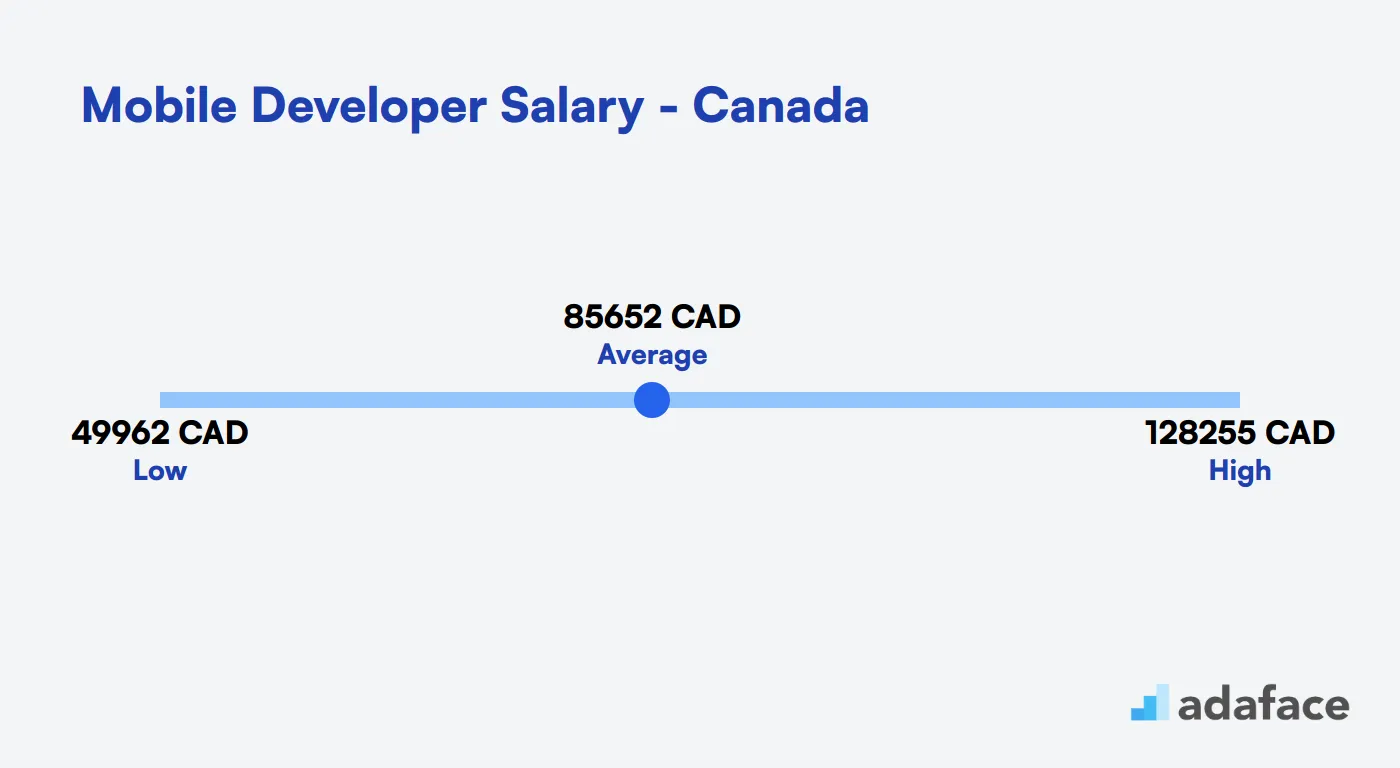
What's the difference between an iOS Developer and an Android Developer?
iOS and Android developers often get lumped together under the 'mobile developer' umbrella. However, these roles have distinct differences that are crucial for recruiters to understand when hiring.
The primary distinction lies in the tech stack and ecosystem. iOS developers work with Swift or Objective-C, using Xcode as their development environment. They follow Apple's Human Interface Guidelines and create apps for iPhones and iPads. Android developers, on the other hand, code in Kotlin or Java using Android Studio. They adhere to Material Design principles and develop for a wide range of Android devices.
Market considerations also play a role. iOS apps are distributed through the Apple App Store, while Android apps go to the Google Play Store. Android typically has a higher market share in emerging markets, which can impact app strategy and developer demand.
When it comes to testing, iOS developers use the iOS Simulator, while Android developers rely on the Android Emulator. These tools help in replicating the user experience across different devices and OS versions.
Understanding these differences is key to finding the right fit for your mobile development needs. Whether you're looking for an iOS or Android specialist, or a cross-platform developer, knowing the unique skills and tools for each platform will help you make informed hiring decisions.
| iOS Developer | Android Developer | |
|---|---|---|
| Primary Programming Language | Swift, Objective-C | Kotlin, Java |
| Development Environment | Xcode | Android Studio |
| Design Guidelines | Human Interface Guidelines | Material Design |
| Operating System | iOS | Android |
| App Store | Apple App Store | Google Play Store |
| Device Range | iPhone, iPad | Various manufacturers |
| Market Share | Lower in emerging markets | Higher in emerging markets |
| Testing | iOS Simulator | Android Emulator |
What are the ranks of Mobile Developers?
Mobile development roles can be confusing due to the variety of platforms and technologies involved. Understanding the different ranks helps in identifying the right fit for your team and project needs.
Junior Mobile Developer: This entry-level position is for those with basic programming skills and some knowledge of mobile platforms. They work on simple features and bug fixes under close supervision.
Mobile Developer: At this mid-level rank, developers have solid experience in one or more mobile platforms. They can independently handle most tasks and contribute significantly to app development projects.
Senior Mobile Developer: These experienced professionals lead development efforts, mentor junior developers, and make critical technical decisions. They often specialize in specific platforms like iOS or Android.
Mobile Architect: This high-level position involves designing the overall structure of mobile applications. They make crucial decisions about technologies, frameworks, and best practices for large-scale projects.
Mobile Development Manager: This role combines technical expertise with leadership skills. They oversee teams of developers, manage project timelines, and communicate with stakeholders.
Chief Mobile Officer (CMO): In large organizations, this executive-level position is responsible for mobile strategy, innovation, and aligning mobile initiatives with business goals.
Hire the Best Mobile Developers for Your Team
In this guide, we've covered the key aspects of hiring mobile developers, from understanding their role to structuring interviews. We've explored the skills to look for, how to write effective job descriptions, and ways to screen candidates efficiently.
The most important takeaway is to use well-crafted job descriptions and skills tests to make your hiring process more accurate. By implementing these strategies, you'll be better equipped to find and hire top mobile development talent that aligns with your project needs and company culture.
Android Online Test
FAQs
Key skills include proficiency in mobile programming languages (such as Swift, Kotlin), understanding of mobile UI/UX principles, and experience with mobile app lifecycle management.
An effective job description should clearly outline the responsibilities, required skills, preferred experience, and details about your company's culture and values. You can find some examples here.
Popular platforms to source mobile developers include LinkedIn, GitHub, Stack Overflow, and specialized job boards like Indeed and Glassdoor.
Look for relevant experience, project outcomes, and specific technical skills related to mobile development. Consider using tools or assessments to verify technical skills.
Recommended tests include coding challenges in Swift, Kotlin, or React Native, as well as UI/UX assessments. You can find specific tests here.
The process should include a technical interview, a coding test, and a cultural fit interview. This helps ensure the candidate matches the technical and cultural requirements of the team.
iOS developers specialize in creating applications for Apple's iOS platform using Swift or Objective-C, while Android developers focus on building apps for the Android platform, typically using Kotlin or Java.

40 min skill tests.
No trick questions.
Accurate shortlisting.
We make it easy for you to find the best candidates in your pipeline with a 40 min skills test.
Try for freeRelated posts
Free resources



